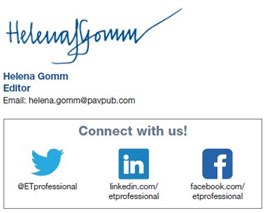November 2017 issue out now...
Do you write your own teaching materials? An increasing number of teachers do, either producing them for their own use, to share online or with colleagues – or even with the intention of getting them published.
In this issue of ETp you will find a wealth of articles about materials development. In our main feature, Sue Kay, Karen Spiller and Karen White, the brains behind Teacher 2 Writer, the organisation that helps guide would-be materials writers, discuss whether materials writing is something that can be learnt or whether it is an innate skill.
One contributor who has worked on several projects to train teachers to write materials is Jon Marks (wellknown to readers of ETp as the artist who produces our Langwich Scool cartoon). He describes his experiences on one such project in a developing country, where the skills that the participants in his workshops were learning would have a profound effect on their own lives and would also be passed on to a much wider circle of colleagues in the future.
John Hughes, co-author with Lindsay Clandfield of ETpedia Materials Writing, offers some tips for producing your own material, and for those who have an eye to getting their work published, experienced editor and publisher Katy Wright addresses the reality of coursebook publishing and how it has changed in recent years.
Several of our contributors have experience of self-publishing. Lindsay Clandfield and Luke Meddings share some insights from having set up The Round, a self-publishing collective. Sheila Thorn describes her own experiences of producing and marketing authentic listening material, and Vita Kogan reports on her progress in trying to publish a language learning game. In our Technology section, David Byrne and Mark Heffernan examine how you can make your own recordings for use as authentic listening material, and Eman Elturki introduces the idea of creating your own customised corpora.
Developments in technology, and our ability to upload and download information at will, have led to a boom in teacher-created materials, but Katherine Bilsborough sounds a note of caution: the internet revolution has made it all too easy for people to share their work, and there is little or no quality control. Quality matters, and we owe it to our students to give them good models of language usage and to supply them with sound texts and exercises that really work. Katherine has done some research on the things that teachers complain about most when it comes to self-published teaching material, and she offers some advice for ways to avoid these pitfalls.



Comments
Write a Comment
Comment Submitted